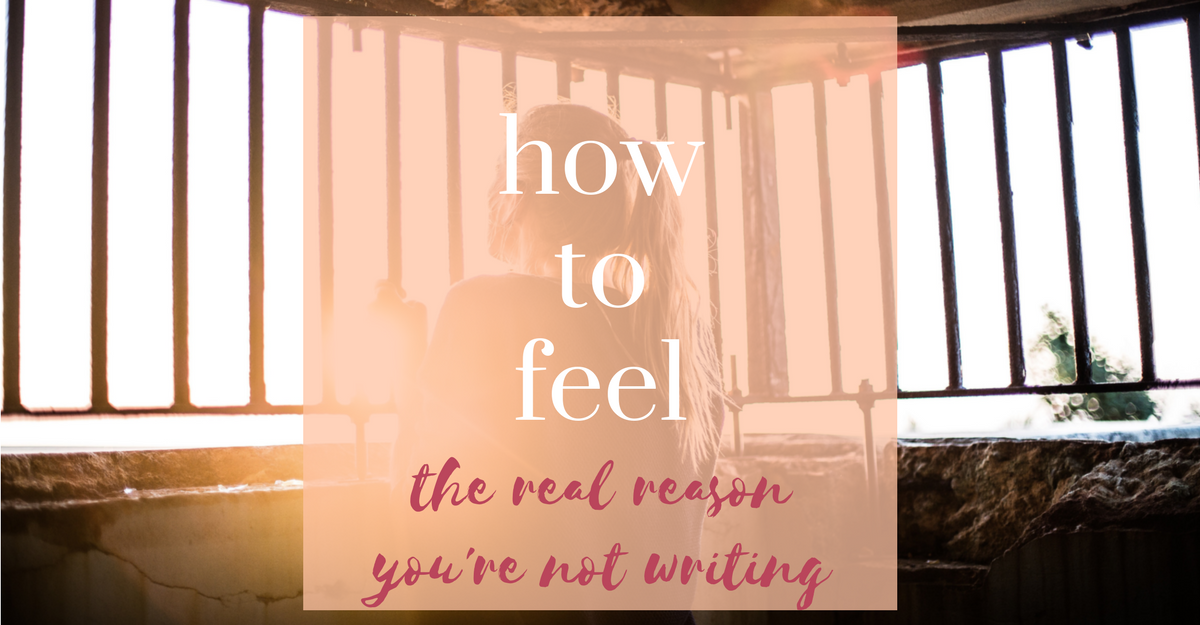How to have a body: an introduction to body awareness
/If you ever procrastinate, experience anxiety, or slip into negativity because you get lost in thought, this post is for you.
I cried during acupuncture today.
“Mind if I stick some needles in your stomach?” the acupuncturist asked at the beginning of my treatment, and of course I said yes, because when do I say no to anyone?
But as I sat alone, trying to enjoy the soothing music, trying to regain the peace and tranquility I felt during my first session last week, my thoughts took over. And my thoughts weren’t pretty: punctured organs, internal bleeding, infection.
I lifted the blanket and studied the steel needles. At the base of each needle, my skin puckered into a divot, which couldn’t be normal, could it? I nearly fished my phone out of my purse and googled how to tell if your liver is punctured.
It sounds funny, doesn’t it? But it wasn’t. I called out for the acupuncturist. I considered ripping out the needles myself, but I was too terrified.
Eventually, she came.
“The needles in my stomach,” I said, my voice shaky, “can they come out now?”
The anxiety I’d mentioned in my intake forms—here it was. Raw and ragged.
My acupuncturist disinfected her hands, sat on a stool. Each movement slow, deliberate.
“I’m here,” she said, “and I’ll take out the needles. But first, close your eyes and feel the anxiety. Tell me how it feels in your body.”
I was too worked-up to resist. My heart was beating fast, I told her. A lump pulsed in my throat. My arms and legs tensed and jittered. I was on the verge of tears.
“It’s OK to feel it,” she said again. “Connect to how it feels.”
Beyond my control, that's how it felt. My body, my anxiety, whether I died from acupuncture—I wanted so desperately to control these things, and ultimately I couldn’t.
So I broke down and cried.
LIFE FROM THE NECK UP
I tend to live from the neck up.
Sure, I moisturize my legs, I wear cashmere sweaters, I bend into downward dog. I feed myself chocolate every damn day. So I experience my share of physical sensations, many of them pleasurable.
But when I try to grasp my lived experience—the substance of my days, the way my life actually feels—I end up with a fistful of thoughts.
Was that too poetic? Here’s another way of putting it: If you ever happen on me while I’m driving, eating, unrolling my yoga mat, or doing pretty much anything, chances are I’m lost in thought.
What do I need to get done this afternoon? I’m already so behind.
I shouldn’t have eaten a third slice of cake. Who eats three slices of cake?
Oh God, did I send that email to the wrong person? Maybe I should check my sent messages.
I’m going to let him down, aren’t I?
I go through most of my hours unaware of any physical sensations at all, except maybe the whipping cold when I get out of my car on a February night or the warm breath of the heaters in yoga class.
I first encountered the idea of “living from the neck up” in Tara Brach’s book Radical Acceptance [affiliate link, as is the above image], which teaches mindfulness and meditation techniques for seeing yourself more clearly and more kindly.
“Many people,” Brach writes, “are so accustomed to being out of touch with the body that they live entirely in a mental world.”
When I read that, I nearly fell out of my chair. Not because I was shocked to realize that I lived “entirely in a mental world,” but because it hadn’t occurred to me that there might be some other way to live.
Oh, but there is.
THE MENTAL SPIN CYCLE
Imagine sitting at your computer. You know you should be working, or writing, or drafting an annoying but important email. Instead you scroll through images of haircuts on Pinterest. You click through house listings on Zillow. You dive down a Facebook rabbithole.
Chances are that your web surfing isn’t particularly pleasurable, because a nasty tickertape runs through the back of your mind: Five more minutes. But I should have started on that task already. But I deserve this break. But I shouldn’t be procrastinating. Why do I always do this?
For me at least, this pattern is hard to short circuit. I want to blow off steam, but avoiding my email or my writing or whatever makes me more tense. So what do I do? I click yet another Zillow listing of a house I can’t afford and don’t particularly want. And I get more and more annoyed with myself.
This is the danger of living from the neck up. Even small things—like getting acupuncture or browsing the internet, for goodness’s sake—can drop me into a mental spin cycle, and it’s bizarrely difficult to break out.
HOW TO KNOW WHETHER YOU’RE IN YOUR BODY
But how do you know whether you’re living in your body or not?
In Radical Acceptance, Brach includes a beautiful thought exercise from Hameed Ali:
When I say, “Are you in your body?” I mean, “Are you completely filling your body?” I want to know whether you are in your feet, or just have feet. Do you live in them, or are they just things you use when you walk? Are you in your belly, or do you just know vaguely that you have a belly? Or is it just for food?
Are you really in your hands, or do you move them from a distance? Are you present in your cells, inhabiting and filling your body? If you aren’t in your body, what significance is there in your experience this moment?
WHY ANY OF THIS MATTERS
Oh, Laura, you might be thinking. Do I seriously need to worry about this?
Yes, we all have plenty to worry about without stopping to ask ourselves, “Am I in my feet right now?”
But connecting to your body is the perfect way to come back into the present moment when you’re lost in a mental spin cycle. As Kristin Neff explains, “It’s the difference between noticing ‘tightness in my chest’ and thinking I can’t believe she said that to me; who does she think she is?”
Here’s the other problem: if you ignore your body, it can drag you around like a mastiff that doesn’t know how to heel.
We all know that our body language reflects our mental state. When we’re tense, our shoulders tighten, our fists clench, and so on.
But the reverse is also true: our bodies influence our mental landscapes. Moving your facial muscles in a way that mimics smiling makes you happier. A confident stance can improve your mood.
So what does hunching over a computer do? How about all of the quirks and aches and areas of tension that don’t even register because we’re lost in thought?
Take a moment right now. Relax your shoulders, draw in a deep breath. Are you inhabiting your body? Could you connect to it if you tried?
WHY WE DISCONNECT
I’ll be honest: I’ve been sitting on this post for a week. There wasn’t any heart to it, and I couldn’t understand why.
Then I cried in acupuncture this morning, and I knew that story—embarrassing as it is—belonged here. And the story of why I disconnected from my body in the first place—that belongs here too.
When I was eleven, a bobble of fat appeared on each of my inner thighs, right above the knee. I pulled at the bit of flab, wondering Where the heck did this come from?
The next day, I studied the legs of the other girls in my gym class. Not one had a weird bobble of fat by her knee.
So I stopped wearing shorts. I agonized over the few steps I’d have to take between the pool and the safety of my beach towel. I hid as best I could.
But then I enrolled in an all-girls Catholic high school with a strict uniform: itchy white blouse, aggressively pleated plaid skirt. Other girls got their skirts hemmed and hiked them up when the nuns weren’t looking, but not me.
Even so, my knees were on display. At home, I’d sit in front of a mirror and study my calves and knees and ankles, trying to see how they looked to the rest of the world.
My legs were no longer a part of me. Instead, they became something I had to manage. Would they look better in tights? How about if I cut out dessert for a few days?
Here’s my theory: for many of us, our bodies are the first thing we try to control and find we can’t, and that's why we disconnect. During high school, I went on approximately a million diets. Each time, I’d lose a few pounds and then gain back even more. The bobble of fat never disappeared.
My body should have been under my control, shouldn’t it? But it wasn’t. So I retreated. So I started to live from the neck up.
RECONNECTING
Just like my acupuncturist promised not to leave the room until she’d pulled out the damn needles, I promise I haven’t dragged you all this way without preparing some strategies for dropping back into your body.
Some people reconnect to their bodies by thinking What do my toes feel like right now? Olivia Fox Cabane recommends this, and it certainly seems to work for her.
For me, though, after years of living from the neck up, my toes just feel like… toes.
So here are a few strategies that have worked for me. Deploy them whenever, wherever, but especially in moments when you feel derailed by panic, perfectionism, or procrastination.
In other words, whenever it’s time to create.
Strategy one: Music
Listen to music, ideally through speakers rather than headphones. Turn up the volume and feel the vibrations in your body. Does the music resonate in your pelvis? Your gut? Your teeth? Pay attention to the muscles of your neck and shoulders. Are they clenched or relaxed? Do your muscles respond to changes in the music’s volume or pitch?
Strategy two: Body scanning
Not an MRI, fortunately. Body scanning is a meditation technique that entails sweeping your attention from your head to your toes, noting how each part of your body feels. You can do this on your own or follow a guided meditation like this one.
Strategy three: Massage
When you get a massage, you can pay attention to physical sensations while remaining relaxed. It’s almost like a facilitated body scan.
If massages aren’t your thing, you could mindfully apply lotion or coconut oil to your arms and legs after a shower.
Do you think body awareness matters? Is it important for your creativity and happiness?
Have you ever connected to your body as a way to escape the mental spin cycle? Any tips or advice?














